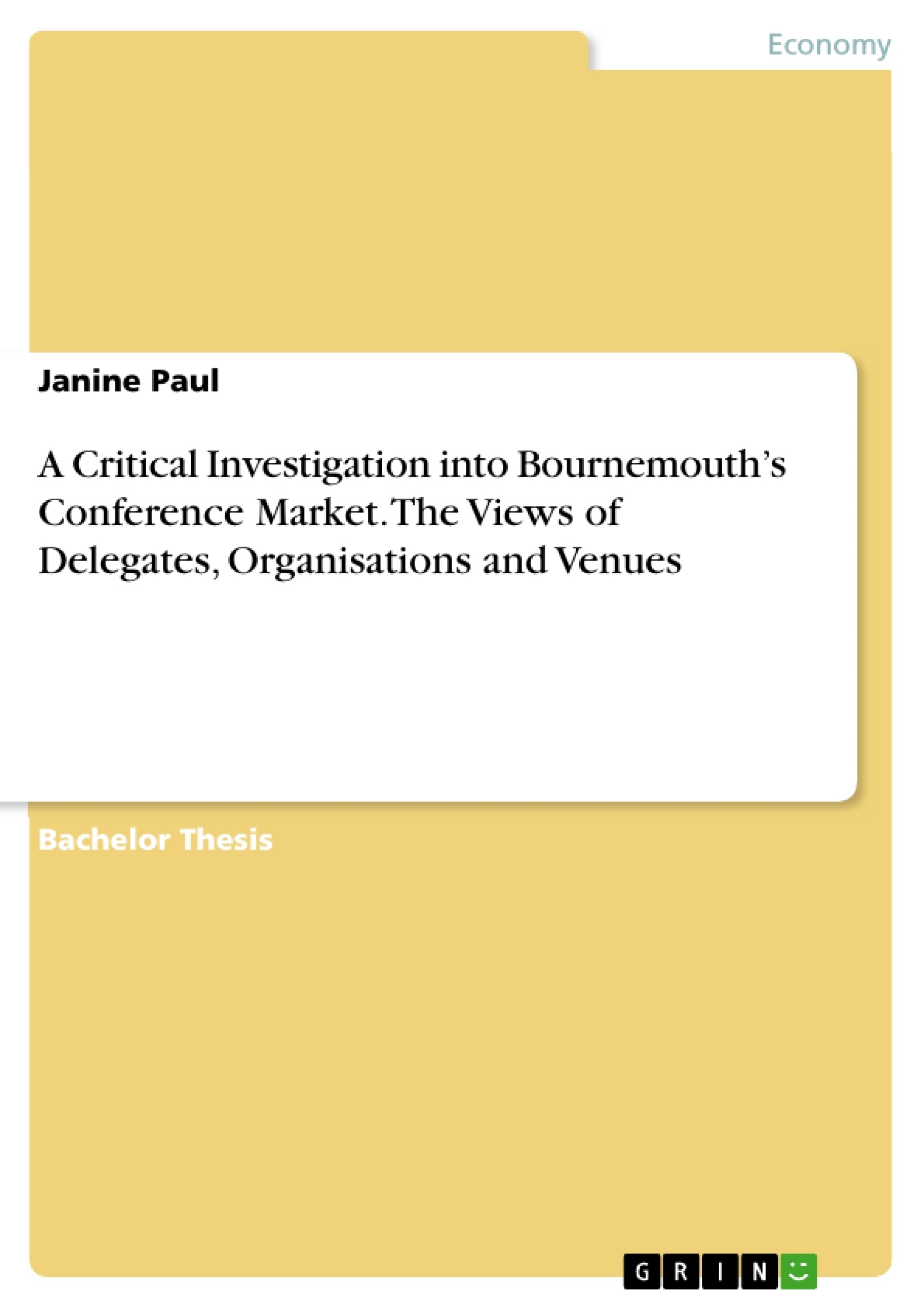The focus of this dissertation is on the perceptions of conferences organisers, venue organisers and delegates of Bournemouth. These groups were investigated through primary research. Consumer decisions of choosing an appropriate venue are exploited. Bournemouth is used as a case study.
The primary goal of conferences in Bournemouth is to contribute to large parts of the economy of the seaside destination. This can be strengthened through emphasising its facilities, reacting to demand of conference organisers and considering needs of delegates. With the help of this work Bournemouth can create a marketing plan adjusted to its conference sector. Furthermore, the findings can be applied by venues, to effectively align their product to the market and by conference organisers to create a successful conference for their attendees.
In general venues are emphasising their physical factors, rather than soft issues and therefore meeting the demand of conference organisers. Those are aware of delegates’ needs, but nevertheless chose a venue with size and facilities as the major considerations.
Bournemouth’s reputation is strongly influenced by its entertainment possibilities also portraying a negative image due to its ‘drinking culture.’ The infrastructure is well established and provides the basic requirements for delegates’ needs to come to the venues, experience the conference and return.
The recommendation for the town’s marketing plan is a focus on delegate’s needs reachable through the common communication channels together with a niche market orientation. This gives it a competitive advantage to differentiate it from its rivals.
Inhaltsverzeichnis (Table of Contents)
- Chapter One - Introduction
- Introduction
- Background to the research study
- Rationale
- Aim
- Objectives
- Dissertation structure
- Conclusion
- Chapter Two - Literature Review
- Introduction
- Conferences and destinations
- Supply side
- Demand side
- Corporations
- Associations
- Delegates
- Conference organisers
- Key issues of the conference industry
- Conference and meeting trends
- Site selection criteria
- Marketing of destinations
- Marketing communication plan
- Branding
- The role of the conference and visitor bureaux (CVB).
- Bournemouth
- Conclusion
- Chapter Three - Methodology
- Introduction
- Primary research
- Questionnaires
- Pilot Study.
- Interviews
- Research Procedure
- Sampling frame
- Analysis
- Limitations
- Conclusion
- Chapter Four - Findings
- Introduction
- Finding One - Site selection criteria
- Finding Two - The delegate
- Finding Three – Image and reputation of Bournemouth
- Finding Four - Bournemouth's strengths and weaknesses
- Finding Five - Standpoint and dynamics of Bournemouth's conference industry
- Conclusion
- Chapter Five - Conclusion and Recommendation
- Introduction
- Meaning of the finings
- Answers to the objectives
- Marketing plan to address the findings
- Current situation
- Marketing.
- Strategy
- Differential Advantage
- A new niche target group
- Synthesis of findings
- Final Conclusion
Zielsetzung und Themenschwerpunkte (Objectives and Key Themes)
This dissertation aims to explore the perceptions of conference organizers, venue organizers, and delegates regarding Bournemouth as a conference destination. It investigates consumer decision-making processes in choosing a suitable venue, using Bournemouth as a case study.
- Understanding the key factors influencing conference site selection
- Analyzing delegate preferences and needs in relation to Bournemouth
- Assessing the image and reputation of Bournemouth as a conference destination
- Identifying Bournemouth's strengths and weaknesses in the conference industry
- Developing a marketing plan to enhance Bournemouth's competitiveness in the conference market
Zusammenfassung der Kapitel (Chapter Summaries)
Chapter One introduces the dissertation's background, rationale, aim, objectives, and structure. It provides context for the research and outlines the key questions to be addressed.
Chapter Two reviews existing literature on conferences, destinations, supply and demand dynamics, key issues in the conference industry, site selection criteria, and marketing strategies for destinations. It explores the role of conference and visitor bureaux (CVB) and examines Bournemouth's position within this context.
Chapter Three details the methodology used for data collection and analysis, including primary research through questionnaires and interviews. It discusses the sampling frame, limitations of the research, and the analytical techniques employed.
Chapter Four presents the findings of the research, focusing on the following themes: site selection criteria, delegate preferences, the image and reputation of Bournemouth, strengths and weaknesses of Bournemouth's conference industry, and the dynamics of the local conference sector.
Chapter Five draws conclusions from the findings and provides recommendations for developing a marketing plan to enhance Bournemouth's competitiveness in the conference market. It suggests strategies to address the identified strengths, weaknesses, and opportunities.
Schlüsselwörter (Keywords)
The key focus areas of this dissertation include conference destination selection, delegate needs and preferences, destination image and reputation, marketing strategies for conference destinations, and the competitive advantage of Bournemouth within the conference industry.
- Quote paper
- Janine Paul (Author), 2007, A Critical Investigation into Bournemouth’s Conference Market. The Views of Delegates, Organisations and Venues, Munich, GRIN Verlag, https://www.grin.com/document/78467




